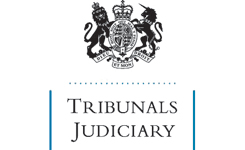|
Notes:
|
Reported as [2011] AACR 42
Tribunal procedure and practice – tribunal jurisdiction in mental health cases – whether application on revocation of community treatment order lapses when new community treatment order made
Tribunal procedure – whether tribunal may treat letter as application
The patient was detained under section 3 of the Mental Health Act 1983 for about two months. A community treatment order was then made, but she was subsequently recalled to hospital and the order was revoked. The hospital managers then referred her case to the First-tier Tribunal as required by section 68(7) of the Act. While the case was pending, a new community treatment order was made and the patient returned to live in the community. Following correspondence with the patient’s solicitors, the First-tier Tribunal decided that a section 68(7) reference should generally be treated as lapsed if, before the hearing, the patient is again discharged from hospital back on to a community treatment order. However, it agreed to treat a letter from the solicitors as an application to the tribunal, under section 66(1)(ca), to consider whether or not to discharge the new community treatment order under section 72(1)(c). In correspondence the First-tier Tribunal had sought to distinguish section 68(7) references from other references and applications, which were the subject of AA v Cheshire and Wirral Partnership NHS Foundation Trust [2009] UKUT 195 (AAC); [2011] AACR 37 and KF v Birmingham and Solihull NHS Mental Health Foundation Trust [2010] UKUT 185 (AAC); [2011] AACR 3, where the Upper Tribunal had decided that such proceedings did not lapse when a community treatment order was made. The patient’s solicitors appealed to the Upper Tribunal.
Held, allowing the appeal, that:
1. whether or not the reference has lapsed depends on the nature of the reference, which is a matter of statutory interpretation and neither the overriding objective in rule 2 of the Tribunal Procedure (First-tier Tribunal) (Health, Education and Social Care Chamber) Rules 2008 (the HESC rules) nor the policy adopted by the First-tier Tribunal is relevant to the issue. Given that the legislation places a patient whose community treatment order has been revoked in the same position as any other patient detained under section 3, the reasoning in KF and AA governed the present case (paragraph 15);
2. the subject matter of a reference under section 68(7) is not related to the circumstances that trigger it. The statutory conditions of detention under section 72 must be satisfied whether the patient is detained in hospital or released under a new order. Accordingly, the subject matter of the reference survives and in line with AA and KF it requires the tribunal to consider the position as at the date of the hearing (paragraph 16);
3. the tribunal’s approach to lapsing was inconsistent with section 68(1) of the Act, which envisages that a section 68(7) reference might be ongoing in the case of a community patient (paragraph 17);
4. there was therefore no scope in the present case for the solicitors’ correspondence to be treated as an application under section 66. The judge commented that the power to treat a document as having a particular status is in general a beneficial one and in accordance with the overriding objective, but it is subject to limits and it is not permissible to take that approach to override an unequivocal indication by a solicitor to the opposite effect, especially when its effect is to deprive a patient of the chance to time her section 66 application for later, should she not obtain her discharge on the reference. The power was appropriately exercised for the applicant’s advantage, not potential detriment (paragraphs 18 to 20);
5. where a patient does not wish to co-operate or even participate in the proceedings, the tribunal must exercise its powers in a way that ensures that the patient’s best interests are protected, bearing in mind that there is a limit to what can be achieved without co-operation. The judge made suggestions as to the responsible exercise of case management in such cases, taking account of the overriding objective and, in particular, of the need to act proportionately under rule 2(2)(a) of the HESC Rules (paragraphs 21 to 26).
The Upper Tribunal Judge remitted the case to the tribunal with directions.
|
